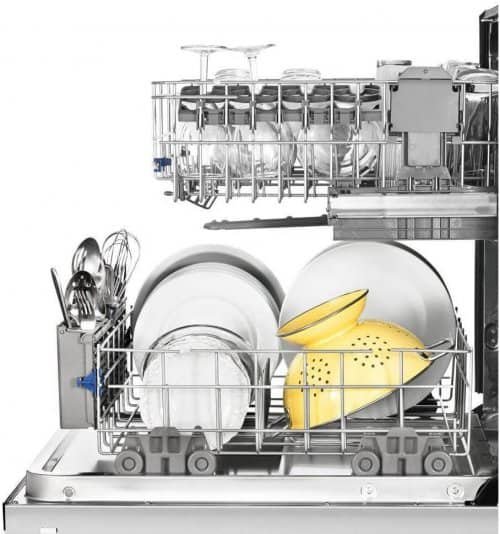A dishwasher water softener is a device that is designed to remove minerals from hard water, which can cause scale buildup and reduce the effectiveness of your dishwasher. Hard water is a common problem in many areas and can cause a variety of issues with your plumbing and appliances. In this article, we will explore the benefits of using a dishwasher water softener, how they work, and some important considerations to keep in mind when choosing one for your home.
Table of Contents
What is Hard Water?
Hard water is water that contains a high concentration of minerals, typically calcium, and magnesium. These minerals can come from the soil and rock formations in the area where the water is sourced and can cause a variety of issues in your home. Some common signs of hard water include:
- Soap scum and residue on surfaces and dishes
- Stiff, scratchy laundry
- Scale buildup in pipes, appliances, and fixtures
- Reduced water pressure
While hard water is not harmful to your health, it can be a nuisance and can cause damage to your plumbing and appliances over time.

How Does a Dishwasher Water Softener Work?
A dishwasher water softener is designed to remove the minerals from hard water before it enters your dishwasher. These devices use a process called ion exchange to remove the calcium and magnesium ions from the water and replace them with sodium ions. The result is softer water that is better suited for cleaning and rinsing your dishes.
The ion exchange process works by passing the hard water through a resin bed, which contains tiny beads that are coated with sodium ions. As the water passes through the resin, the calcium and magnesium ions are attracted to the sodium ions and are exchanged, leaving the water softer and more effective for cleaning.
Once the resin bed has reached its capacity and can no longer effectively exchange ions, the dishwasher water softener will need to be regenerated. This involves flushing the resin bed with a brine solution, which replaces the sodium ions on the beads and allows them to continue exchanging ions with the incoming hard water.
Benefits of Using a Dishwasher Water Softener
Using a dishwasher water softener can provide a number of benefits for your home and your appliances. Some of the most significant benefits include:
- Cleaner Dishes: Soft water is better suited for cleaning and rinsing dishes, and can help prevent soap scum and residue from forming on your dishes and in your dishwasher.
- Longer Appliance Lifespan: Hard water can cause scale buildup in your dishwasher and other appliances, which can reduce their effectiveness and lifespan. Using a dishwasher water softener can help prevent this buildup and extend the lifespan of your appliances.
- Better Water Efficiency: Soft water is better at dissolving soap and detergent, which means you can use less of these products and still achieve clean dishes.
- Improved Water Quality: Soft water can also improve the taste and clarity of your drinking water, as well as reduce the mineral buildup in your pipes and fixtures.
Considerations When Choosing a Dishwasher Water Softener
When choosing a dishwasher water softener, there are a few important considerations to keep in mind:
- Capacity: The capacity of your dishwasher water softener will depend on the size of your household and your water usage. Be sure to choose a model that can accommodate your needs.
- Regeneration Cycle: The regeneration cycle of your dishwasher water softener will determine how often it needs to be regenerated. Look for a model with a cycle that is suited to your household’s water usage and needs.
- Installation: Dishwasher water softeners can be installed in a variety of ways, including as a standalone unit or as part of a larger water softening system. Be sure to choose a model and installation method that is compatible with your dishwasher and plumbing.
- Maintenance: Like any appliance, your dishwasher water softener will require regular maintenance to ensure it continues to function effectively. This may include regular regeneration, cleaning the resin bed, and checking for any leaks or malfunctions. Consider the maintenance requirements of the model you choose and ensure that you are willing and able to keep up with them.
It’s also important to note that a dishwasher water softener may not completely eliminate all hard water issues in your home. While it can greatly reduce the mineral content in your dishwasher, you may still experience issues with soap scum, scale buildup, and other hard water problems in other areas of your home. Consider a larger water-softening system if you want to address these issues throughout your home.
In addition to a dishwasher water softener, there are other steps you can take to reduce hard water issues in your home. These may include:
- Using a rinse aid in your dishwasher helps prevent spotting and residue on your dishes.
- Cleaning your dishwasher regularly to prevent scale buildup.
- Using a water softening system for your entire home to address hard water issues throughout your plumbing and appliances.
- Using a water filtration system improves the quality and taste of your drinking water.
In conclusion, a dishwasher water softener can be a valuable investment for any household that experiences hard water issues. By removing minerals from your water, a dishwasher water softener can help prevent scale buildup in your dishwasher, improve the effectiveness of your cleaning products, and extend the lifespan of your appliances. Consider the capacity, regeneration cycle, installation, and maintenance requirements of a model when choosing one for your home, and remember that it may not completely eliminate all hard water issues in your home.

